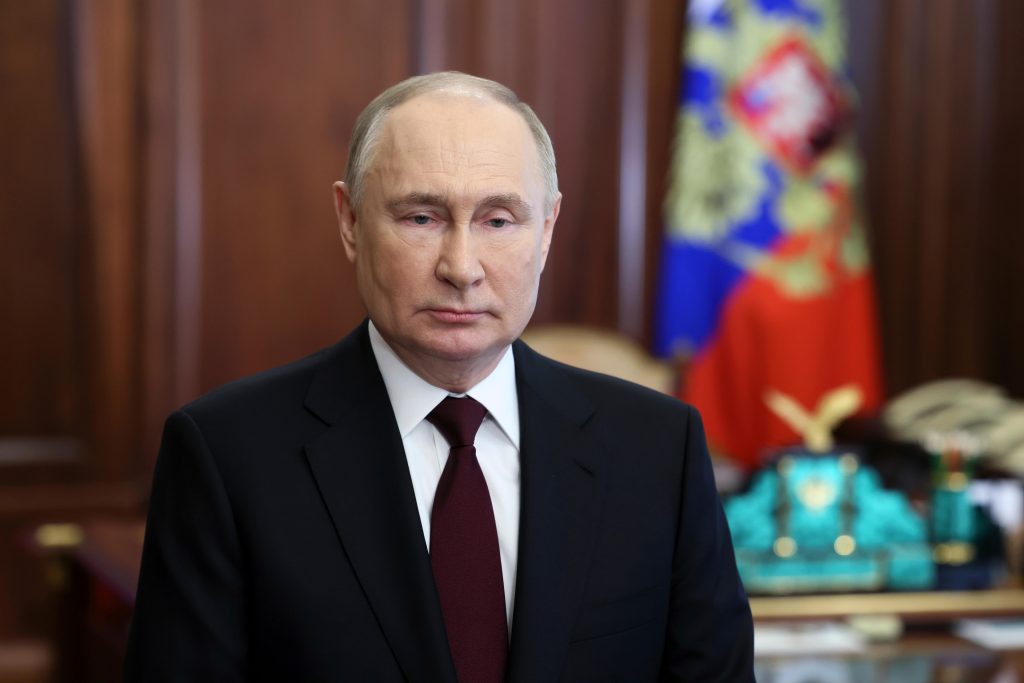By EMMA BURROWS (Associated Press)
Ukraine reportedly fired at least eight missiles at Russia’s Belgorod border area, resulting in the death of two people and the injury of 12, according to local officials on Thursday. This occurred while Kyiv’s forces seemed to continue their attempts to unsettle the Kremlin as Russia’s presidential election approaches amid a severe crackdown on dissent.
In addition, Ukrainian forces made unsuccessful cross-border attacks in Belgorod and the Kursk region, as reported by local authorities. The Russian Defense Ministry asserted that its troops killed 195 Ukrainian soldiers and destroyed five tanks and four armored infantry vehicles, just two days after claiming to have killed 234 Ukrainian troops in another border assault.
It is impossible to confirm the Russian claims independently. Cross-border attacks in the area have been sporadic since the war began and have been the subject of conflicting reports, disinformation, and propaganda.
The recent Ukrainian attacks on Russian territory, including long-range drone strikes and alleged incursions by Russia-affiliated groups based in Ukraine, have coincided with Russian President Vladimir Putin's virtually assured reelection.
Putin has been working to convince Russians to keep him in power against the backdrop of what he describes as foreign threats to the country and as the Ukraine conflict enters its third year.
In a video released on Thursday, Putin urged Russians to participate in the election, describing voting as a 'demonstration of patriotic sentiment.'
Stating that “the people are the only source of power in our country,” Putin urged Russians to “not only cast your vote, but also firmly express your will and aspirations, showing your personal involvement in Russia's future development.”
“Elections are a step into the future,” Putin said.
Since assuming power nearly 25 years ago, Putin has quashed nearly all independent media and opposition voices in Russia, particularly following the 2022 full-scale invasion of Ukraine, which initially faced significant setbacks.
Analysts suggest that the Kremlin is concerned about low voter turnout during the three-day voting period and needs Russians to participate in order to legitimize Putin's virtually certain re-election to another six-year term.
Sam Greene, from the Center for European Policy Analysis in Washington, referred to Russia’s election as “a sham.”
“The Kremlin controls who appears on the ballot. It also controls the rules for campaigning,” Greene stated to The Associated Press. “Not to mention its ability to oversee every aspect of the voting and vote counting process.”
Russia’s exiled opposition leaders are urging Russians to protest against the election by gathering at polling stations at noon on Sunday to indicate their lack of support for Putin. The event has been named “Noon Against Putin” and has garnered support from Yulia Navalnaya, the wife of Alexei Navalny, Russia’s most prominent opposition leader who recently died in a remote Arctic penal colony.
Though Russia initially faced challenges in the war, when its attack on Kyiv faltered and Western countries supported Ukraine by providing weapons and training troops, military analysts now believe the Kremlin's forces have gained the upper hand on the battlefield.
This is mostly because aid from the West has reduced because of shortages in Europe and is currently delayed in the United States due to political disagreements.
The Institute for the Study of War, a think tank in Washington, stated that Russian forces have control over the timing, location, and scale of offensive operations on the battlefield for now.
The International Institute for Strategic Studies stated that Russia’s attack is picking up speed and the next months are crucial for the direction of the conflict.
NATO Secretary-General Jens Stoltenberg cautioned on Thursday that the delay in delivering supplies to Ukraine is leading to loss of lives.
Stoltenberg told reporters in Brussels, "Ukrainians are not losing their bravery, they are running out of ammunition."
While Ukraine struggles with increasingly scarce battlefield resources, Russia has significantly increased its own weapons production and is getting ammunition from Iran and North Korea.
The think tank said in a report on Wednesday that this is a bad sign for Ukraine once Putin has secured his power.
The International Institute for Strategic Studies stated, “During spring and summer, Russia is likely to launch a series of major attacks to cause Ukrainian casualties, push defenders westward, and increase its control of occupied territories.”
At the moment, they mentioned, “the land war appears to be brutal and favors Moscow.”
___
___
Find AP’s coverage of the war in Ukraine at https://apnews.com/hub/russia-ukraine









